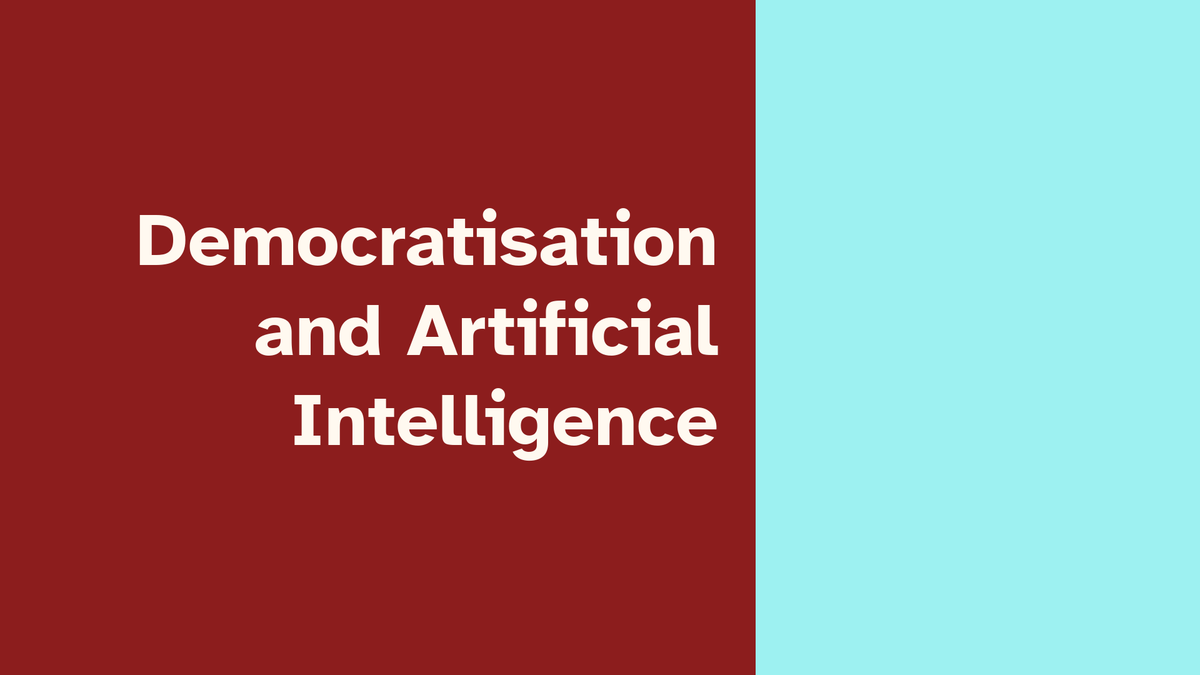Democratisation and AI
A philosophical critique of AI “democratisation,” exploring how skill, freedom and education relate, drawing on Plato, Aristotle, Heidegger and Berlin.

I keep hearing AI fanatics talk about the “democratisation” of various skills. For example, AI image generators are said to allow users to express their ideas without the handicap of needing to develop skills of illustration. What's interesting here is that this implies the pre–Generative AI world was one of tyranny. I'd like to explore the implied ideology here.
Skill is a knowledge of how to do something. Our conception of this in the West is largely influenced by Ancient Greek philosophy on this point, in particular Plato. For Plato, a skill contains genuine knowledge about the world. A carpenter can make a table, not because of a certain practical habit and facility with wood, but because of their knowledge of Wood and Table in themselves. This intellectual knowledge, a grasp of the being of all wood and all tables, is what guides their body's actions in production. They know how these materials work and as such can build an imitation of the true, original, God-made table. The education of the carpenter, therefore, is less a practical exercise and more a slow, steady coming-to-know of wood, tables, chairs, cabinets and so on. It is for this reason that Socrates tells us in the Apology, the account of his defence speech when on trial, that the first group of people he speaks to in search of wisdom are the artisans. They are not simply experienced practitioners; they are wise in the matters under their care.
In a sense, then, skill can never be “democratic”, if democratic means being available to everyone who wants it.[1] To gain a skill means to gain knowledge, and this requires work. And yet, not simply hard work, in the sense of the Protestant work ethic. As Aristotle points out in the Nicomachean Ethics, simple laborious repetition does not lead only to virtues but also vices. What is required is hard work that is correct, hence the traditional relationship between artisan and apprentice. The artisan oversees the development of the apprentice’s education. As Heidegger points out, this is “not mere practice” in the sense of gaining “facility with tools”, nor does the apprentice merely “gather knowledge about the customary forms”, i.e. mere theory. Instead, the apprentice needs to “make themself answer and respond above all to the different kinds of wood and to the shapes slumbering within wood”, by which Heidegger means a “relatedness to wood”, a genuine understanding relationship with “all the hidden riches of its essence”.[2] This careful cultivation takes time, care, work, error and perseverance. It can only be held by the minority who commit a significant portion of their lives to developing this fundamental, practical knowledge: handicraft, as Heidegger names it here.
There are certainly political issues with access to this sort of training and education. A major role of guilds, for example, was in controlling the number of apprentices so that the relevant skills were kept rare enough to control the supply, and therefore the incomes of all involved. In this sense, there will always be a gate and it will always have a keeper in matters of skill. A skill always grants power; access to that skill is always restricted. Therefore, I am willing to concede that skills are “undemocratic”, if democratic means everyone has an equal right to all power.[3]
However, this is far from the only political interpretation of the unequal distribution of skill. Plato’s Republic argues that each citizen should specialise in the one skill they are most well suited to performing. This is the very nature of the just society, for Plato, where everyone contributes according to their ability. Carpenters should carpent, architects should architect, and artists should create, albeit under a strict totalitarian programme dictated by the philosopher-kings. This is itself undemocratic, if democratic means society should be led by the consent of the people.[4]
It is my view that this fetish for an equal distribution of the merit of skills without an equal distribution of the labour involved in learning them is grounded in the dichotomy between negative and positive freedom. These concepts, popularised in modern discourse by Isaiah Berlin but coined by Immanuel Kant, denote our “freedom from…” something and our “freedom to do…” something respectively. If freedom simply means nothing holding me back (negative), then all expertise is elitist, since your greater ability at such-and-such a skill prevents me from profiting in that line of work. However, if freedom is understood positively, as only borne out through education, training and nurturing so that I have the ability to actually use my autonomy for the good of myself and others, then skill itself is the essence of freedom. Only through learning and teaching do we truly gain our freedom. On the positive account, to view automation of creative skills as a liberation is to miss freedom altogether.
AI tools can help automate or speed up laborious tasks, in some cases. That's pretty swell. But I've been left to wonder at those who want to use generative AI to bypass genuine learning. Sure, for hobbies when a skill is adjacent, I get it. If you play D&D and you're not good at drawing, but want some character art, image-generation tools offer a more creative alternative to stealing portraits from DeviantArt and Pinterest. However, this is not freedom; it is convenience. Could it be that, contrary to Marx's image, we've found this new technology only for it to automate our literary criticism so we have enough time in the evening to work in a warehouse?
